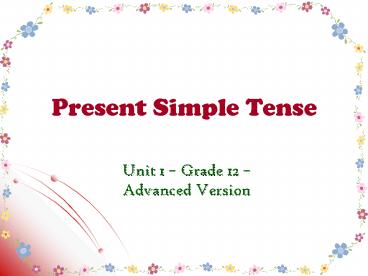Present Simple Tense - PowerPoint PPT Presentation
1 / 16
Title:
Present Simple Tense
Description:
s, z, x, ch, sh. Exceptions: have has; go goes; do does. Phuong Tam - Nhu Quynh - Mai Trinh ... g. Water boils at 100 degrees Celsius. Habits. E.g. British ... – PowerPoint PPT presentation
Number of Views:114
Avg rating:3.0/5.0
Title: Present Simple Tense
1
Present Simple Tense
- Unit 1 Grade 12 Advanced Version
2
Present Simple Tense Exercise
- Sure you know all about the Present Simple Tense?
Try this exercise - Choose the correct word or phrase in each
sentence. - That must be the end of the first part of the
performance. What happens/ happening now? - Whats the matter? Why do you look/ are you
looking at me like that? - To be honest, I am doubting/ doubt whether Jim
will be here next week. - Pay no attention to Graham. He is just being/ is
sarcastic.
3
Contents
4
Present Simple Tense Exercise
- Here is the key
- That must be the end of the first part of the
performance. What happens/ happening now? - Whats the matter? Why do you look/ are you
looking at me like that? - To be honest, I am doubting/ doubt whether Jim
will be here next week. - Pay no attention to Graham. He is just being/ is
sarcastic.
5
Present Simple Tense Spelling Rules
- Look at the examples of third person singular
forms and answer the questions.
Catches, cooks, does, eats, enjoys, fixes, flies,
goes, lives, makes, misses, passes, plays,
pushes, reads, replies, says, shops, smokes,
speaks, stands, teaches, thinks, tries, waits,
washes, works.
6
Present Simple Tense Spelling Rules
- What is the most common way of making the third
person singular? - What happens with words ending in vowel -y ?
- What happens with words ending in consonant -y
? - After which consonants and groups of consonants
do we add es?
7
Present Simple Tense Spelling Rules
- What is the most common way of making the third
person singular? - ? By adding s.
- What happens with words ending in vowel -y ?
- ? We add s.
8
Present Simple Tense Spelling Rules
- What happens with words ending in consonant -y
? - ? We change y to ies.
- After which consonants and groups of consonants
do we add es? - s, z, x, ch, sh.
- Exceptions
- have ? has go ? goes do ? does.
9
Present Simple Tense Spelling Rules
- Write the third person singular of these verbs
Box, brush, buy, complete, cry, defend, deny,
destroy, excite, expect, fry, guess, look, pray,
reach, receive, rush, spend, want, watch.
10
Present Simple vs. Present Continuous
- Present Simple
- Facts that are always true
- E.g. Water boils at 100 degrees Celsius.
- Habits
- E.g. British people drink a lot of tea
- States
- E.g. I dont like gangster films.
- Present Continuous
- Temporary actions
- E.g. Im staying in a hotel until I find a flat.
- Actions that are actually in progress
- E.g. The dog is sleeping on our bed.
- Actions in progress but not actually happening at
the moment - E.g. Im learning to drive.
11
Present Simple vs. Present ContinuousState Verbs
- Some verbs are not normally used in progressive
form. They are state verbs which describe a
continuing state
Believe, belong, consist, contain, doubt, fit,
have, know, like, love, matter, mean, need, own,
prefer, seem, suppose, suspect, understand, want,
wish
12
Present Simple vs. Present ContinuousState Verbs
- Some verbs have a stative meaning and a different
active meaning. Typical examples are
Be, depend, feel, have, measure, see, taste,
think, weigh
Compare
13
Present Simple vs. Present ContinuousState Verbs
- Put each verb in brackets into the present simple
tense or present continuous - I _____ (hear) that you have been promoted.
Congratulations! - I hope Sarah will be here soon. I _____ (depend)
on her. - Please be quiet, Dave. You _____ (forever/
interrupt). - Hey, you! What _____ (you/ think) youre doing?
- Jane is away on holiday so Linda ____ (handle)
her work.
14
Present Simple vs. Present ContinuousState Verbs
- Here is the key
- I hear that you have been promoted.
Congratulations! - I hope Sarah will be here soon. I am depending on
her. - Please be quiet, Dave. You are forever
interrupting. - Hey, you! What do you think youre doing?
- Jane is away on holiday so Linda is handling her
work.
15
Other Uses of Present Simple
16
The end































